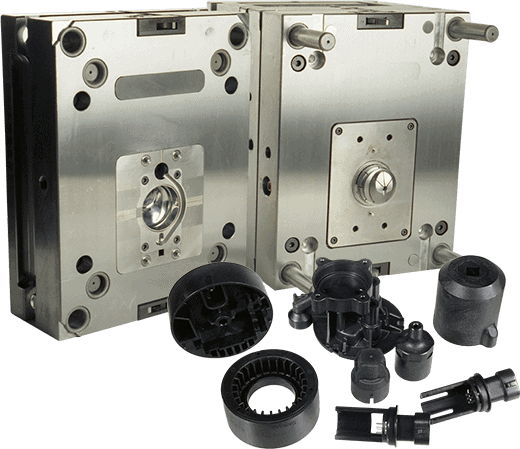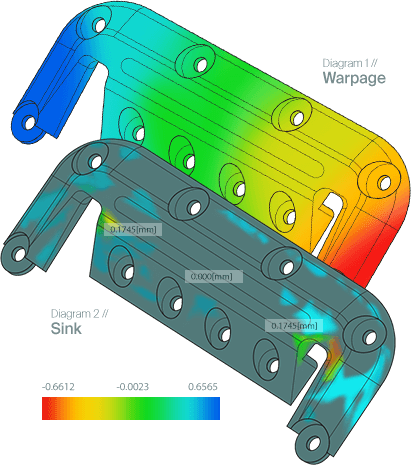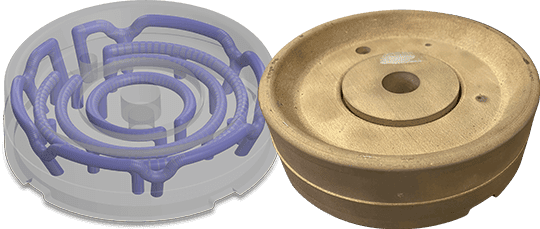Fathom Manufacturing //
Domestic
Injection Molding
Skip the logistics and supply chain issues
with injection molding right here in the US.
Looking for offshore or hybrid injection molding? Contact our experts to find the perfect solution for you!

Skip the Logistical
Challenges Typically
Associated with
Offshore Production

US-Based and Certified
with 35 to 600 Ton Presses,
Bi-Injected Presses, and
ISO 900:2015 Certification

Convenience of
Real-Time On-Site
Trialing to Ensure
Project Specifications

Advanced Mold Making
Technologies with
3D Printing and
Automated EDM Cells
Our Fathom Experts recognize the value of having design and manufacturing collaboration at any stage in the product development process, and a DfM analysis is available with every quote. Our diverse group of engineers, designers and builders help you navigate the right process, materials and more for each stage of your product development – from design and prototype, to validation for mass-production.
And with easy quoting and intuitive project management tools through our SmartQuote platform, you can move rapidly and confidently through your product’s lifecycle, navigate supply chain distruptions, and to deliver to market blazingly fast.
With over 530+ machines across 25+ manufacturing processes, Fathom scales with your needs, from prototype, to bridge, to production qualities.
![]()
Easy Quoting and Project
Management in SmartQuote
Platform, with Access to
Engineering Feedback
![]()
Comprehensive and Diverse
Manufacturing Processes,
with 25+ Different
Manufacturing Processes
Across the Fathom Brand

Fathom provides high-quality plastic injection mold design, precision mold making, and close-tolerance injection molding services for a complete custom manufacturing experience. Fathom utilizes state-of-the-art mold making technologies to provide high-quality plastic injection mold design, precision mold making and close tolerance injection molding services for small–to–medium injection molds projects. Fathom works closely with our customers in the medical, packaging, consumer technology, automotive and electrical industries that require optimized productivity and overall lowest manufacturing cost to find the perfect solution.
The focus in today’s prototype world has been to create prototypes which mimic the production component, in the areas of precision, part weight, cycle times, and tooling costs. Our goal is to ensure that we meet and exceed our customers’ expectations with prototypes that are delivered quickly, accurately. Our process begins with meeting and discussing the goals of the customer prototype component and deciding as to the type of prototype tooling that fits their needs.

Production cycle times are one of the most critical factors when considering piece part costs as it relates to the type of production tooling features. Production tools need to process, cool, and eject parts quickly. There are many factors to consider when trying to achieve optimum cycles and we offer many techniques and have succeeded with over our many years of experience and knowledge of doing prototype components. In addition, our speed and cost efficiencies through machining and EDM cell automation allows our lead times and cost to be significantly lower than competitors.


Additional advanced tooling includes:

Fathom will review your quote and alert you of any potential issues that need to be acknowledged and discussed, and/or problem areas that need to be redesigned, like a necessary draft angle for ejection, or a thick wall that may cause a sink mark.
We will advise you of these situations and always make sure you are in agreement with changing your model. There may be cases where the situation is not critical to you and you approve for us to proceed with your model as-is, but at least we will have brought it to your attention. You are always in control!


A leader in industrial closures and packaging components was having assembly issues in the field due to a particular part feature warping, which limited its cap functionality. This faulty feature was caused from the long cycles necessary to cool part during the injection molding process. However due to the deep draw, it was difficult to get proper cooling into the cavity.
Fathom tooling engineers took a different approach, designing conformal cooling into a new core insert, and delivered results that saved the customer valuable time and money.
Fathom works with clients in the medical, packaging, consumer technology, automotive and electrical industries that require optimized productivity and overall lowest manufacturing cost.
With over 100 years of tool building experience, Fathom stands above the rest for your customer experience. Gain access to:
Start a quote today or talk with one of our experts!
Precision manufacturing
from coast to coast.
HEADQUARTERS //
1050 Walnut Ridge Drive
Hartland, WI 53029
877-328-4668
ARIZONA
444 W. 21st St. Ste. 101
Tempe, AZ 85282
480-966-2300
CALIFORNIA
46758 Lakeview Blvd
Fremont, CA 94538
COLORADO
7770 Washington St.
Denver, CO 80229
303-288-6855
FLORIDA
14000 N.W. 58th Court
Miami Lakes, FL 33014
305-889-3280
ILLINOIS
1207 Adams Drive
McHenry, IL 60051
815-385-7500
1401 Brummel Ave
Elk Grove, IL 60007
847-952-8088
MINNESOTA
13758 Johnson Street NE
Ham Lake, MN 55304
763-755-7575
NEW YORK
1920 Slaterville Rd.
Ithaca, NY 14850
607-277-7070
401 W. Shore Blvd.
Newark, NY 14513
315-331-7680
TEXAS
1513 Sam Bass Rd.
Round Rock, TX 78660
512-255-1477